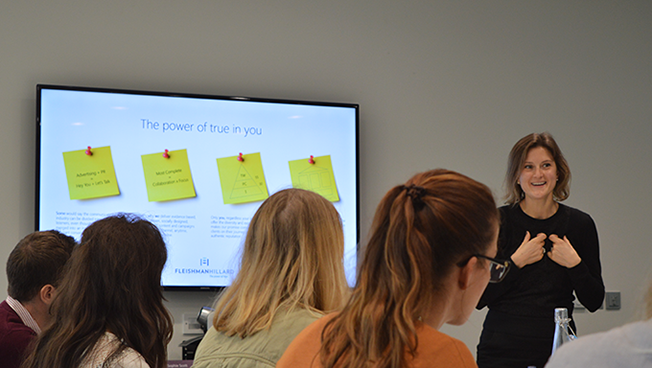With International Women’s Day last week, we asked one of our longest serving women, Sophie Scott to write about her experience, challenges and highlights of working while being a mother of two.

I know that there are more men on Boards called James than there are women on boards altogether, despite the fact that companies with women on their boards perform better. It’s a bit galling, of course, but working here at FleishmanHillard Fishburn, the issue of women in business has never really been an issue for me personally. But being asked to write this blog got me thinking.
I’ve realised that gender has never really been an issue for me because I work at a slightly weird company. Let me explain: We’ve done the maths and we do not have any gender pay disparity in London. The Board I’m currently on consists of six women and two men. For the sixth consecutive year, we were named a “Top Company for Executive Women” by the US National Association for Female Executives (NAFE). And I can genuinely say that I have never felt held back at work because of my sex.
Plus, I really don’t do anything special. I come here every day to work with a truly amazing team and a group of incredible clients. I love my job. I just about manage to juggle motherhood and working thanks to a mix of an amazing husband and a truly understanding and flexible employer. And in my mind, that’s kind of it.
But on reflection, maybe this IS special.
A large number of my best female friends haven’t had sexism-free careers. And many of them felt that working and having a fulfilling family life was completely incompatible. When I think about it, when we were choosing a career and potential employer, we talked a lot about role and responsibility, title, compensation, work styles, culture and benefits. But we didn’t discuss long-term career prospects or the need to plan around inherent industry sexism. We certainly didn’t think about the potential to work and have a family. Nor did we talk to the boys about potential careers where we’d have the opportunity to pursue interests outside of the workplace. But these things all matter so much.
In short, when I came to FHF twelve years ago, I lucked out. First, because I work for a special employer. Second, because I don’t have to view my job as special. Because in this company, being a successful woman, mother, executive and manager is, well, just normal. Not something to think about, not something to worry about.
So, on reflection, we need to recognise that what I do, and what my employer does, is very special. Special because other women don’t get this opportunity. Special because I want more women, my daughter included, to have opportunity like this. And special because the more that this becomes the norm, the better the world – and our bottom lines – will be.
Find Out More
-
Platinum CMS Award
March 13, 2024
-
Changing Communications Tack at Mobile World Congress
February 21, 2024


